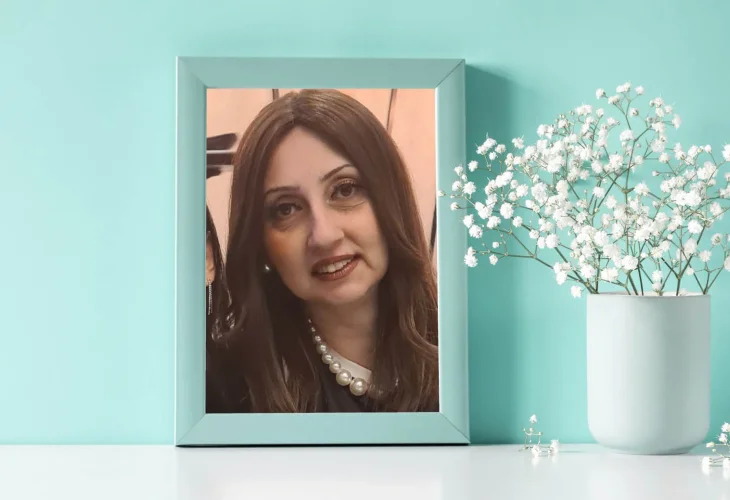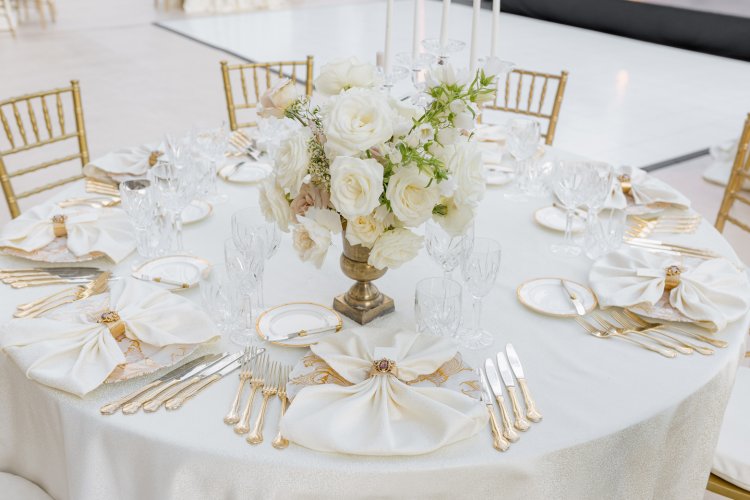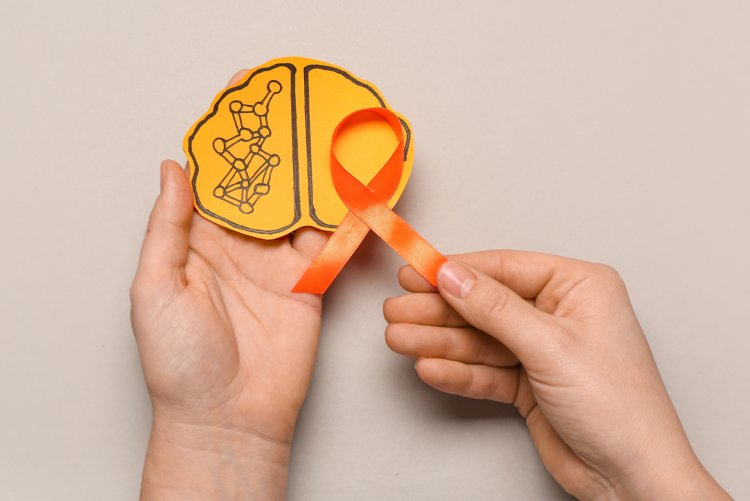Ten Years Undiagnosed: Hannah's Journey with Multiple Sclerosis
After facing early challenges and maintaining her faith as the sole observant member in her family, Hannah Tahlov hoped for peace. Her diagnosis with multiple sclerosis changed everything. She shares her story of perseverance, strength, and the educational method she developed.
 Hannah Tahlov
Hannah Tahlov"I wish I could meet my teacher, Hannah Hochberger, again, who taught me as a child at the boarding school in Jerusalem, the esteemed teacher Mira Maimon from Netivot, and the secretary Gila from the boarding school, among so many special individuals who were 'good angels' on my journey," Hannah Tahlov says as she shares her life story filled with upheavals.
"I was an 11-year-old girl when I was taken from home and sent to a boarding school, and by age 19, as I began my return to faith journey, I arrived to study in Netivot. I faced so many trials over those years, and it's clear to me that being a mother to six children today, all of whom are devoted to Torah study, is absolutely thanks to those anointed figures that Heaven sent my way. The way I've managed the multiple sclerosis that has been with me for the last twenty years is undoubtedly because of them as well. Hashem sent me so many good and special messengers who prepared me for everything I was meant to face in life."
 (Photo: shutterstock)
(Photo: shutterstock)Childhood Trials and Triumphs
"I was born to older parents," Hannah begins her story, "My mother was 37 at the time of my birth, and my father was close to 60. Another sister was born three years after me. In total, we were four tightly-packed kids at home, plus an older brother from my mother's previous marriage. Financially, things were very difficult, and there was never an easy moment. Additionally, my mother was caring for her mother, who had become dependent on care, during those challenging times. My father was a wonderful and cheerful person, but neither young nor healthy."
As a child, Hannah notes that she faced additional trials because unlike her siblings, both considered gifted and 'successful at school,' she struggled with concentration issues and failed to meet her parents' and teachers' expectations.
"I had to deal with challenges at home and at school, where expectations and anger were overwhelming," she recalls, "The peak was reached in sixth grade when my father had a heart attack on the way to the synagogue and passed away. My mom took it very hard, and our already dire financial situation worsened. It was clear at that time that my mother couldn't raise us emotionally or financially, and so at 11, I was sent to the Beit Wingertine boarding school in Jerusalem, along with my sister, who was seven and a half then."
"I remember the first days at the boarding school, joining an unfamiliar class with new girls and feeling utterly broken, with no motivation or talent, not believing I could amount to anything. Then my first 'angel,' the teacher Hannah Hochberger, took me under her wing right away, calling me her 'protégé.' She handed me a stack of notebooks and encouraged me: 'You can do it,' 'You’re almost there,' and 'Look how capable you are.' Not a day passed without her sitting with me to see my writing, progress, and achievements. Today, grown up, I understand how teacher Hannah did it; she simply put me on the right track. I owe her the credit for making me believe in myself and witness results."
"Afterward, more teachers and significant figures appeared exactly at the right moments for me. For instance, our boarding school secretary, a particularly sweet young woman, genuinely cared for my sister and me. I remember one Sunday after a free Shabbat, it snowed heavily. Mom sent us back without proper winter clothing, with skirts made from loose fabrics. I recall us trudging up the snowy hill to the school, holding onto a broken umbrella with one hand and keeping our skirts from falling with the other, shivering. Upon arrival, the secretary greeted us warmly, handed us clean clothes, and ensured we lacked nothing. To this day, I recall it with tears. The care, timely kind words, and genuine concern were so crucial."
"After several years in school, I continued to one of the city's leading high schools, where I blossomed both socially and academically. I completed a full matriculation, including four units in English, finding myself capable and successful, sometimes even more so than everyone else."
 (Photo: shutterstock)
(Photo: shutterstock)"I Organized My Engagement on My Own"
In her senior year, Hannah strengthened in her faith and decided she wanted to observe mitzvot. "I didn't know how to go about it," she recounts, "Because even though our family was traditionally Jewish, the religion never played a significant role at home, and some of my siblings were decidedly anti-religious. So, when I was away from home, I dressed modestly and kept to it as best as I could, and when at home, I made sure not to eat non-kosher foods and refrained from watching TV."
"When I finished high school, I had to choose a professional study, and I decided on the seminar in Netivot, under the famed teacher Mira Maimon, known for her positive approach, belief, and personality building. To this day, I thank the Creator for sending me there. Those were spiritually enriching years, with the perfect people besides me. I was privileged to spend two amazing years at a warm incubator, listening to classes on Judaism, Torah, and laws that enriched me, and also studying the teaching profession, which by then was clear to me as my career choice, learning life through the lens of faith and positive thinking."
Hannah notes that her greatest dream was to marry a God-fearing scholar dedicated to Torah, but she knew it wouldn’t come easily. "When I met my husband," she shares, "my brothers objected strongly, arguing, 'You should marry a university graduate, not a yeshiva student.' Ultimately, we parted ways for three months, after which it became clear I would do everything to restore the match because 'he was my intended.' This time, we did it with guidance from a rabbi, and my teacher Smadar encouraged me to 'keep the cart rolling.'"
"We decided to finalize the match, but I had no one to organize the engagement. In the end, I used a bit of money I had to buy fruit and cakes in Bnei Brak, and we held the engagement at my sister's home in Holon. My biggest fear was that my family wouldn’t come to the wedding, and I recall arriving at the hall at the start of the evening to find it empty and my heart sinking. But in the end, they came, and the wedding was a joyous and emotional affair."
After the wedding, Hannah began her teaching career, and soon the children started to arrive. "We were happy," she recalls, "I felt so privileged to raise my kids at home, knowing it's no small feat, and believed that I'd overcome life's challenges, with peace and health ahead. I never imagined the struggles to come."
 (Photo: shutterstock)
(Photo: shutterstock)The Diagnosis: Multiple Sclerosis
Hannah and her husband had two sons, then a daughter. But after the third birth, Hannah noticed she was seeing double. "Instead of seeing the baby once, I saw her four times because in each eye I saw twice," she tries to illustrate. "Additionally, I experienced blurry vision and halos at the start of each day. Naturally, the first visit was to an ophthalmologist, who sent me for a CT scan. After a month of anxiety and thoughts about possibly having a tumor, it turned out everything was normal. The symptoms subsided, and life went on."
"During my fourth pregnancy, I experienced unknown symptoms, primarily falls. I would be walking down the street and suddenly fall, without understanding why. Then came another pregnancy, and after the birth, I encountered a new phenomenon: numbness in my legs, as if I couldn't feel them."
"The sixth pregnancy brought all the symptoms together: numbness in the legs, neck pain, double vision, and overall weakness. For two years, I managed the situation, but then reached a point where I could hardly walk. Only then did I go to Ichilov Hospital, where it was diagnosed as multiple sclerosis."
Hannah remembers the diagnosis day as if it were yesterday. "It was right before Shavuot," she recounts, "When I realized I would be admitted to the hospital, I made sure to cook for the kids and clean the house before leaving. I don’t want to describe the efforts those tasks took, crashing into walls already, but I didn’t give in. Honestly, I wasn’t surprised by the multiple sclerosis discovery. I felt my body wasn’t functioning, but the real shock was realizing the sclerosis had been active for ten years without my knowledge."
How do you cope with such news? How do you move forward?
"It was very tough. Especially since the person who informed me wasn’t very sensitive and wasn’t well-informed. From her description, it sounded like life was shortening, and I felt like I was about to die soon. That day, I called my sister-in-law to ask if she’d take care of my two-year-old daughter, fearing I’d never see her again."
"Two weeks after being discharged, we celebrated our eldest son's bar mitzvah, and I remember being emotionally stormy – so happy and excited about the event, yet terribly anxious about the future. Honestly, it took about three months to start accepting that I was sick, learning not to complain about it because it’s the will of the King of Kings, and being grateful that, thank God, my disease progresses slowly with ongoing medical advancements."
Hannah states that the time a disease emerges is a time for introspection, and during that period, she learned to view life recognizing how much Hashem was with her every step, always sending the right figures to accompany her. "That led me to decide that I also want to be among those good people. As a teacher, I developed the skill to uplift students who are on the edge, not just to thank them but to provide the love they need and ensure they don’t fall through the cracks. A student with attention deficits and impulsivity succeeded, with Heaven's help, to fit into the class with my support. Another student with learning difficulties received special workbooks to help him endure, and I maintained eye contact with him throughout lessons."
"In the years leading up to the diagnosis, I taught elementary grades, drawing joy and satisfaction from the ability to encourage the charming girls and witnessing their personal growth from every word of encouragement and strengthening. While the sclerosis forced me to stop formal teaching, I decided to leverage the essence of a woman's role as a mother and a teaching educator in Israel. I developed the 'Six Effects' method, allowing us as parents and educators to instill resilience in children, which they so desperately need. I created an audio-visual program combining my lecture and discussion with musical segments and an empowering screen display, teaching every mother and educator to believe in themselves and how significant they are in shaping character, along with learning how to do this in an empowering and positive way. My program is for parent evenings, team building, teachers, and even seminar-class girls."
"Additionally, I opened WhatsApp groups for mothers with weekly reinforcement on character-building, and I deliver lectures and workshops to groups by appointment. Day by day, I understand how much power and strength we hold as parents and educators, how much influence we can have on our kids, and how, through focusing on their qualities, a kind word can truly build their world."
And how are you today?
"Thank God, my condition is stable, with flare-ups occurring only occasionally. I try to manage the household as much as I can, but I've internalized that many tasks exhaust me, and I can’t do everything. I do what I can, like preparing meals because I believe a hot meal welcoming the kids home makes the day. But I almost don't perform household chores, and my older daughters handle them."
"Professionally, as I mentioned, I lead groups, offer advice, and deliver lectures, confident in one key belief: 'The response children and students yearn for is attention, viewing them in a positive light, believing in them, and they in turn will give their all.' Within this, I find time to say Psalms and strengthen my faith and closeness to the Creator, understanding He is the healer of all flesh, the only one who can heal any ailment."

